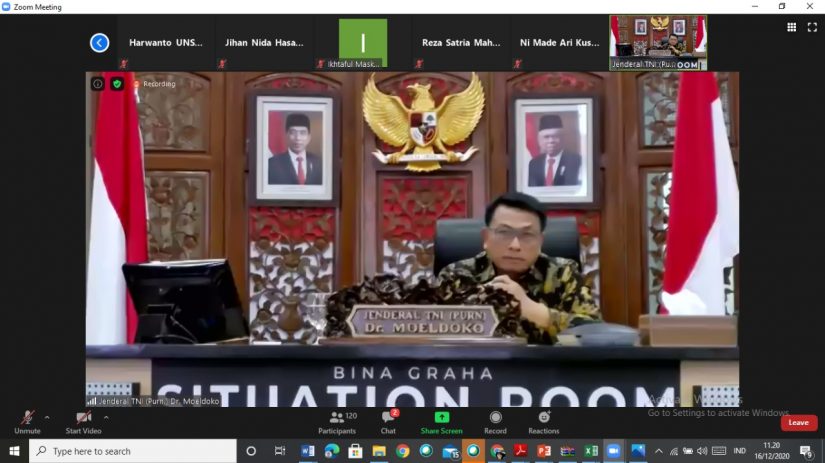
In the midst of an economic recession, the agricultural sector grew 2.19% in Q2-2020 and 2.15% in Q3-2020, but the livestock sub-sector contracted, namely minus 1.84% in Q2-2020 and minus 0.16% in Q3- 2020 because the added value is also depressed.
This was said by the General Chair of the Indonesian Farmers Association (HKTI), General TNI (Purn.). Dr. H. Moeldoko, SIP., Who is also the Head of the Presidential Office Staff, at the 2020 National Symposium on Livestock Research and Development organized by the Faculty of Animal Science (FAS) UGM on Wednesday, 16 December 2020 online via Zoom.
“The issue of people’s purchasing power during the Covid-19 pandemic has hit the livestock sub-sector. Even so, livestock business actors have tried hard to innovate in the entire process of the livestock product value chain. This innovation needs to be done because changes in the strategic environment are also moving fast,” Moeldoko said.
The performance of large livestock is quite good, although not very spectacular. The increase in meat production is still positive, although it is quite slow. 2020 beef production is around 422 thousand tons, while consumption is above 500 thousand tons, so Indonesia has to import to meet these needs. Live cattle imports in 2020 will be around 770 thousand heads (equivalent to 122 thousand tons of meat), plus frozen meat of more than 100 thousand tons. Live cattle imports are carried out to fatten beef cattle companies. To prepare superior resource in animal husbandry, Indonesia has developed and is developing a People’s Animal Husbandry Field School (SLPR) to increase the productivity of local livestock, especially those on a small scale.
“There are some classic problems in beef cattle agribusiness in Indonesia, namely the number of breeders at 4.6 million households with 2-3 ownership scales, about 99% of the household scale. The calving interval is 18-21 months (ideal 14-16), the pregnancy rate is 56% (70% ideal), and the calving mortality rate is quite high, 5-10%, ” Moeldoko explained.
Artificial insemination with Simental and Limousin cement can reduce the population of local cattle which have actually been adapted to a typical Indonesian environment, because breeders prefer to keep these cattle of European breeds (Simental, Limousin), when compared to raising local cattle.
Moeldoko added, another problem is the inadequate performance of production and reproducibility as a result of the relatively low adoption of reproductive technologies such as Artificial Insemination (IB), feed technology and animal health which are not yet fully developed and have not even reached half (50%) of total productive females.
From the existing problems, strategies that can be taken are related to cultivation and technology so that farmers get out of this situation. The second strategy is an effective and efficient marketing and commerce strategy by utilizing infrastructure such as digital technology (technology 4.0).
“There are several solutions that can be taken, including making animal feed in collaboration with companies, measuring the use of organic fertilizers, managing research and development centers in collaboration with companies, making modern local livestock tools for affordable prices, and mapping regional areas. livestock according to the geographical conditions of the region as sources of livestock management, synergize between regions, ” Moeldoko said.
Dean of the Faculty of Animal Science UGM, Prof. Dr. Ir. Ali Agus, DAA., DEA., IPU., ASEAN. Eng said after the event, this symposium was the 3rd symposium held in the context of the 51st Anniversary with the theme “Innovation and the Latest Livestock Development Strategy to Support Sustainable Agricultural Development”. Given that innovation is the heart of the progress of a business and industry, regardless of its type, the livestock industry is no exception.
The production of livestock food products which are not sufficiently supplied from domestic production (the fact is that many are still imported), so innovation must be carried out in order to support the increase in domestic production capacity due to the increasing need for food from livestock. This also provides an opportunity for the younger generation to enter the world of the livestock industry, which is actually still very prospective.
“If this opportunity is not taken with the support of technology and innovation, it will be taken by other people and we will increasingly depend on imported food products. The increasing dependence on food and imported foodstuffs will seriously endanger the sovereignty of our nation and country, ” Ali said.
The 3rd seminar event invited practitioner speakers such as Ir. Tumiyono, MBA, CEO and owner of PT Widodo Makmur Group, Jakarta, who has a long experience in the livestock business. As an experienced business actor, the sensitivity to the dynamics of both macro and micro problems in Indonesia, including how to survive and thrive in difficult economic conditions, has been explained. Another resource person was the Head of the BNI Yogyakarta Regional Office, Mr. Moh. Hisyam, who conveyed the strategy and importance of institutional support, especially from the aspect of capital. Ir. Nafiatul Umami, S.Pt., M.P., Ph.D., IPM. ASEAN. Eng., Lecturer of Faculty of Animal Science UGM, conveyed the development of forage innovation. In addition, there were also speakers from Wageningen University, the Netherlands, namely Dr. Simon Oosting, who discussed various issues such as global warming and integrated livestock systems in support of sustainable agriculture.
“The symposium is expected to inspire how the prospect of the livestock industry is very broad and very competitive, so that inevitably we have to adopt technology and make innovations to make it more competitive and productive,” said Ali.
